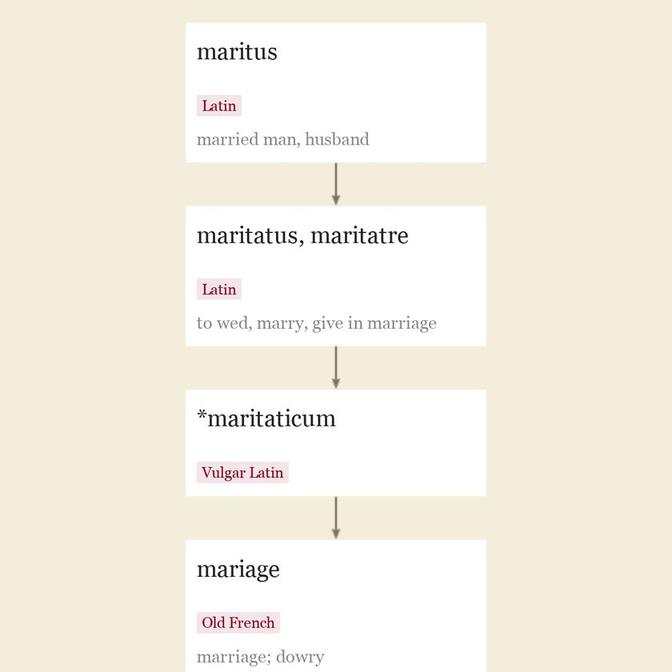remarriage n.
also re-marriage, "
Entries linking to remarriage
word-forming element meaning "
Watkins (2000) describes this as a Latin combining form conceivably from Indo-European *wret-, metathetical variant of *wert- "
In earliest Latin the prefix became red- before vowels and h-, a form preserved in redact, redeem, redolent, redundant, redintegrate, and, in disguise, render (v.). In some English words from French and Italian re- appears as ra- and the following consonant is often doubled (see rally (v.1)).
The many meanings in the notion of "
Often merely intensive, and in many of the older borrowings from French and Latin the precise sense of re- is forgotten, lost in secondary senses, or weakened beyond recognition, so that it has no apparent semantic content (receive, recommend, recover, reduce, recreate, refer, religion, remain, request, require). There seem to have been more such words in Middle English than after, e.g. recomfort (v.) "
And, due to sound changes and accent shifts, re- sometimes entirely loses its identity as a prefix (rebel, relic, remnant, restive, rest (n.2) "
It was used from Middle English in forming words from Germanic as well as Latin elements (rebuild, refill, reset, rewrite), and was used so even in Old French (regret, regard, reward, etc.).
Prefixed to a word beginning with e, re- is separated by a hyphen, as re-establish, re-estate, re-edify, etc. ; or else the second e has a dieresis over it: as, reëstablish, reëmbark, etc. The hyphen is also sometimes used to bring out emphatically the sense of repetition or iteration : as, sung and re-sung. The dieresis is not used over other vowels than e when re is prefixed : thus, reinforce, reunite, reabolish. [Century Dictionary, 1895]

c. 1300, mariage, "
Meanings "
[W]hen two people are under the influence of the most violent, most insane, most delusive, and most transient of passions, they are required to swear that they will remain in that excited, abnormal, and exhausting condition until death do them part. [G.B. Shaw, preface to "Getting Married," 1908]
Marriage counseling is recorded by that name by 1939. Marriage bed, figurative of marital intercourse generally, is attested from 1580s (bed of marriage is from early 15c.).
updated on June 27, 2021
- intramural
- intramuscular
- intrans.
- intransigence
- intransigent
- in-transit
- intransitive
- intranslatable
- intransmissible
- intransmutable
- intra-ocular
- intra-orbital
- intra-ovarian
- intra-peritoneal
- intra-personal
- intra-psychic
- intraspecific
- intra-uterine
- intravenous
- intrench
- intrepid
- intrepidity
- intricacy
- intricate
- intrigant